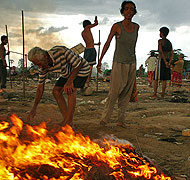Frenzied development in Cambodia pushes its people out of the capital to squalid conditions
Published on 14 June 2006At the early hour of 4 am on June 6, 2006 around 700 police and military police in full riot gear circled Sambok Chap village and erected roadblocks - as far as 1km away - to prevent access to the village. In a show of determined force rarely seen in the capital, the police build up would be the final push by the authorities to forcefully evict the remaining residents of Sambok Chap village on the banks of the Tonle Bassac River.
The eviction of Sambok Chap village by the Sour Srun Company began on May 3, 2006, and was authorized by the Phnom Penh municipality. Within a month, more than 1300 families would be moved from this central location to 2 relocation sites, some 20km out of central Phnom Penh. Prior to the eviction very little details were given to NGOs requesting information on how the eviction would take place and how the relocation and allocation of land would be handled.
On the morning of May 3, a small contingent of riot police and demolition workers settled in the village and began dismantling houses and directing land owners to trucks that would transport them to their new village. However, for those persons renting, no solution was brought to them. Relocated residents also soon realized that their new home at Trapeang Anh Chanh village was nothing more than land without adequate amenities (running water, sewage, electricity, access to health services, etc.).
Regardless of the growing criticism from the NGO community and some residents' refusal to relocate, the authorities continued to dismantle housing. Families which remained on site were forced to live in small make-shift housing. At the same time, authorities refused to allow the distribution of humanitarian aid, including food and tents, on the site by NGOs.
With the onset of the rainy season, growing concerns over the squalid health and sanitary conditions were ignored by both the company and the municipality. In an apparent effort to conceal the dire conditions of the Sambok Chap village, company workers constructed a barrier fence shielding the site from outside viewing and further restraining the remaining residents.
On the morning of May 31, a large number of the remaining families who were left homeless since the beginning of the operation attempted to return and erect tents on the land they had previously lived on. Workers were then sent in to dismantle the new tents. This confrontation triggered an outbreak of violence after some residents were injured by village guards: a pregnant woman, and an 11 years old child.
As a result, the authorities' administration building was burnt down and the barrier fence was destroyed by the angered community. By mid-day, the contingent of riot police and company workers retreated from the village.
On June 6 the stand off reached its peak when a 700 strong contingent of police and military personnel equipped with rifles, batons, shields and tear gas was mobilized at night to move the remaining families out of the site. NGOs, Media and the UN human rights office were all refused access to the village. Cameras were forbidden and notebooks were confiscated by policemen as the final eviction unfolded. Eight community members were detained.
On June 8, six individuals previously detained were released, while two community members, Mr. Chan Ra and Mr. Chhen Sovann, were charged with "wrongful damage to property" under Article 52 of the UNTAC Law.
LICADHO's medical office is deeply concerned for the health and safety of the residents now located at Trapeang Anh Chanh and Angdaung village. As the rainy season continues the lack for food, shelter, and access to medical center only worsens the health conditions.
LICADHO and other partner NGOs urge the government to fulfill its duties to provide basic amenities at Trapeang Anh Chanh and Angdaung village. Furthermore, NGOs stress the need for a transparent process in allocating land titles to the relocated residents to avoid similar problems should they ever be evicted in the future.
- Topics
- Land rights
- Related Material







